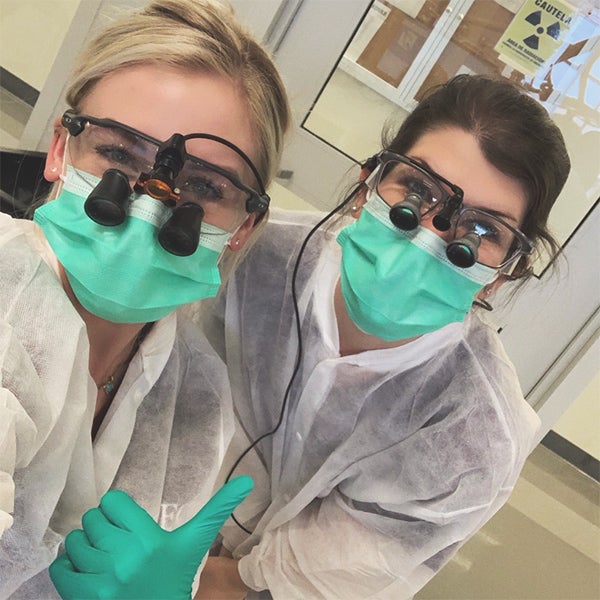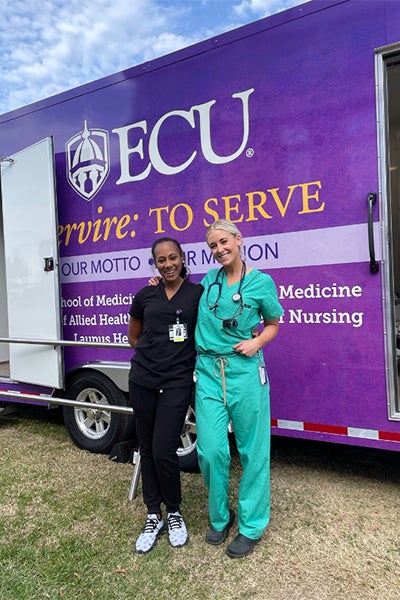Dental student nurtures lifelong interests toward a career in oral surgery
When Rachel Cantrell was 5 years old and on fishing trips with her father, she was fascinated by the process of cleaning the fish.
Observing the parts of living things and how they work has been a lifelong interest for Cantrell, who will graduate on May 6 from the East Carolina University School of Dental Medicine. She is set to begin her next chapter at Emory University in an integrated MD/oral surgery program. Her hope is to eventually become an oral and maxillofacial surgeon.

Rachel Cantrell met lifelong friends during her time in the ECU School of Dental Medicine, including Ashley Huff Collins, shown here during their first year. (Contributed photos)
“Although some may find it grotesque, it was an intense curiosity to understand the intricacy of the inner workings of the head and neck,” Cantrell said. “The anatomic norm is a beautiful thing, but when diseases or trauma effect the norm, it’s even more beautiful to see a surgeon take an unfortunate disfigurement and turn it back into a masterpiece — never forgetting the masterpiece is a human life with vulnerability and emotion. Compassion when caring for patients is just as important as the physical intervention itself.”
Cantrell, a native of Washington, North Carolina, went to ECU for her undergraduate education and earned a master’s degree in biology from Mississippi College. She was a 2020-21 J. Bradley Wilson Schweitzer Fellow, partnering with the dental school’s oral medicine clinic to address the unmet health care needs of vulnerable populations and educating women on autoimmune diseases. Through that project, she completed more than 200 hours of community service in addition to volunteering in Missions of Mercy clinics and engaging in mission trips.
Cantrell also founded the Interdisciplinary Oral Medicine Study Club to integrate the study of medicine, dentistry and other health professions.
“My passion for this cohesive mix of dentistry, medicine and surgery has only grown as the years have passed,” she said.
Those activities allowed Cantrell to explore research, foster her interests and talents and hone her skills in patient-provider interaction.
“It’s always been a dream of mine to study the human art form and play a role in shaping that form, whether that be a clinician who listens to connect and understand,” she said, “to help create intangible change in patient’s lives or by shaping a physical form with the use of my hands in the operating room.”
Her residency at Emory will be the next step toward fulfilling those dreams — but also a deeper fulfillment of a purpose.
“It’s difficult to apply the right words to describe a feeling when there is such strong desire and passion toward a vision,” Cantrell said. “Words simply don’t do it justice.”

Dental students Rachel Cantrell and Octavia Miller volunteer during a head and neck cancer screening event in Hyde County earlier this year.
In April 2021, Cantrell provided care to a patient who had not smiled in 15 years because of the condition of their teeth. Following surgical extractions in preparation for dentures, the patient sent a letter praising Cantrell’s compassionate care throughout the process. That interaction became her “why.”
“Many times, we don’t know the impact of our actions until after the moment has passed. I carry with me a passion to serve and an incredibly strong desire to become the best surgeon I can be,” she said. “I want to continue bringing joy and making change in peoples’ lives, especially in the surgical setting where patients can feel uneasy and afraid. I want to be a light in their journey, however big or small.”
That approach has been solidified through Cantrell’s experiences at the dental school and its community service learning centers, where fourth-year students complete three, nine-week clinical rotations.
That model of education offered Cantrell a glimpse at life and health care across North Carolina on a clinical journey that cemented her goals for the future.
“Dentistry is such an incredibly beautiful field, and I’m thankful my path led me here to ECU to gain such vast clinical experience,” she said.
She hopes current and future students will take to heart the lessons they learn in the classroom, clinic and community.
“Always remember that your perspective on life will ultimately steer your trajectory. Life will throw you curveballs and it will certainly test you, but what’s most important is how you react to it,” she said. “Take the most difficult and challenging adversities and view them from a positive lens: what it’s going to teach you and how it’s going to make you a stronger individual, and in time, a stronger clinician.”
Cantrell will carry those reminders as she begins the next step on her path toward becoming an oral surgeon, going back to her reason for doing what she does in the simplest sense.
“People come to you at their most vulnerable states and put their trust in you,” she said. “I find it so rewarding and honorable to be that person for them.”